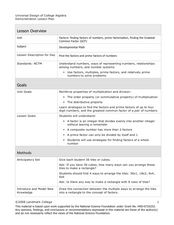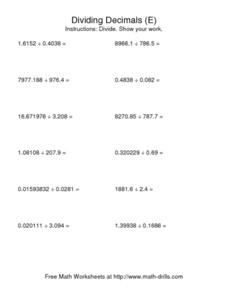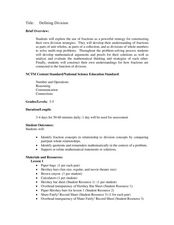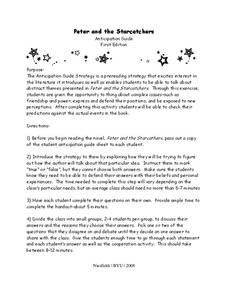Curated OER
How the West Was One - Three x Four
While this activity provides a motivating and interesting way to review the concept of the order of operations, it involves the use of software called How the West Was One + Three x Four. There are also other resources that are...
Curated OER
Find the Factors and Prime Factors
Show the class how to find the factors of numbers. They use a variety of strategies, including unifix cubes, to find the factors of a whole number. This resource includes clear procedure to follow. Included are an anticipatory set,...
Curated OER
Mixed Numbers
For this improper fraction worksheet, 4th graders review and study how to solve improper fractions as mixed numbers. Students write an improper fraction for two pictures and change each improper fraction to a mixed number or whole number...
Curated OER
Dividing Decimals (E)
For this dividing decimals practice worksheet, students solve 12 problems that require them to divide whole numbers and decimal numbers by decimal numbers.
Curated OER
Primes in Product
In this secondary mathematics activity, students must determine the two prime numbers and one composite number that would be factors of the given product. The one page activity contains one problem with the solution.
Curated OER
Dividing by Powers of Ten (A)
In this powers of ten learning exercise, students multiply four to eight-digit numbers by powers of ten from 1 to 1,000. This two-page learning exercise contains approximately 50 problems, with answers.
Curated OER
Defining Division
Upper graders explore division through fair-shares. They will review fair shares and fractions as a segway into division. They start by playing "Share Fairly" game and create mathematical arguments for solving problems. Manipulatives and...
DK Publishing
Multiply or Divide? Part 2
Explore the relationship between multiplication and division as scholars fill in these number sentences, each of which is missing a symbol. Is it a multiplication or division equation? There are 18 of these to start, all written...
DK Publishing
Multiply or Divide? Choosing the Operation
Division or multiplication? Scholars examine 36 number sentences, each missing either a division or multiplication symbol...but which one fits? They write in the signs based on the numbers given, all of which are whole numbers. The first...
Science Matters
Oh Heron
Two teams—the environmentalists and herons—play four rounds of the game, Oh Heron. Using hand symbols to represent food, shelter, and water, players locate their match to produce more herons while those unmatched decompose.
Curated OER
The Whole is More Than Half
Students explore number sense by completing a food related fraction activity. In this parts of a whole lesson, students utilize a graham cracker to divide and identify what a quarter, third, or half looks like. Students eat their snack...
Curated OER
Number Manipulation
In this number manipulation worksheet, students solve 4 different types of problems that include number manipulation. First, they use division, multiplication, addition, or subtraction to make each set of numbers into equations which...
Curated OER
Chapter 1 - Objective 2.1 Basic Operations
In this basic operations worksheet, students add, subtract, multiply, and divide whole positive and negative numbers. This one-page worksheet contains ten problems.
National Security Agency
Introducing Integers and Their Operations
There's nothing negative about this mini-unit on integers! Engaging young mathematicians in a series of hands-on activities and collaborative learning opportunities, this resource offers an excellent way to introduce your class...
Curated OER
Dividing Decimals
In this mathematics worksheet, 6th graders find the quotient for each problem listed. Then thy explain their estimates, divide, and multiply to check their answers.
EngageNY
The Euclidean Algorithm as an Application of the Long Division Algorithm
Individuals learn to apply the Euclidean algorithm to find the greatest common factor of two numbers. Additionally, the lesson connects greatest common factor to the largest square that can be drawn in a rectangle.
West Contra Costa Unified School District
The Power of Ten: Building a Magnitude Model
Add visual representation to teaching place value with a magnitude model. Using adding machine tape, pupils build a linear place value strip from 1 to 100.
Curated OER
Fractions on a Number Line
Number lines can be used to show fractions. Use this basic worksheet to introduce this concept to third and fourth grade learners. There are three number lines provided, and your learner must fill in the missing fractions.
Curated OER
Peter and the Starcatchers: Anticipation Guide
Pique your pupils' interest before reading Peter and the Starcatchers with an anticipation guide. Given a list of 10 statements, learners choose true or false based on what they think the book is about. They then discuss in small...
Scholastic
Pilgrim and Wampanoag Daily Life for Grades 6–8
Two slide shows, viewed side-by-side, permit middle schoolers to compare and contrast the lives of the Pilgrims of the Plimoth colony and the Wampanoags. Four videos take learners on virtual field trips to the Plymouth plantation. And an...
K5 Learning
Ned and Rover and Jack
This isn't your ordinary short story with questions; it's actually two tales in one. First, find out what happens with Ned and Rover, then switch characters to discover the what happens between Jack and Rover.
Curated OER
Fractions Dividing By Whole Numbers
In this math worksheet, students examine the patterns in the pie graphs and identify the common one. They also divide the fractions by whole numbers for the set of problems.
Curated OER
Introduction to Equivalent Fractions
Explore equivalent fractions! Youngters measure the crown of their head with adding tape labeled with various fractions and fractional parts, and compare strips to notice numerical relationships. They fold adding tape in half and color...
Curated OER
Goldentail's Rounding Railroad
In this number puzzle worksheet, students solve 24 equations in each of two sets of multiplication and division problems. They circle each answer and round them to the nearest whole number. They use the secret code that is shown in a box...























